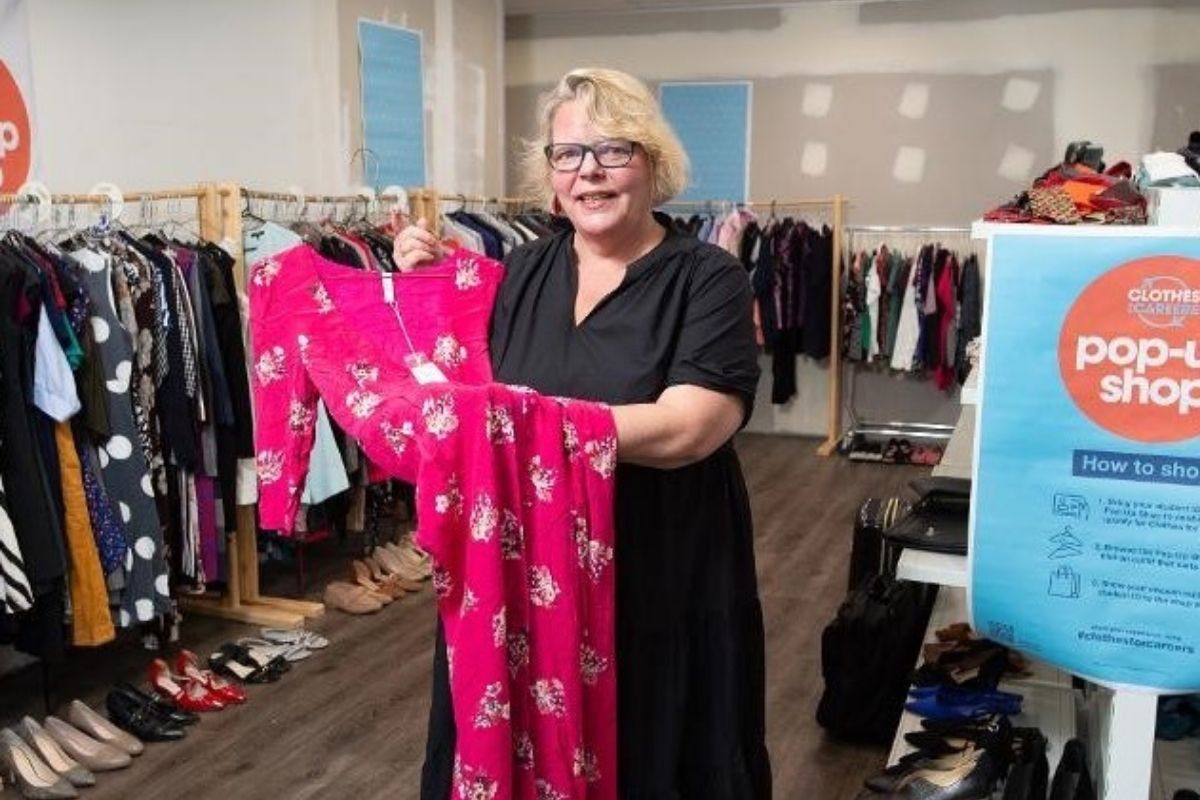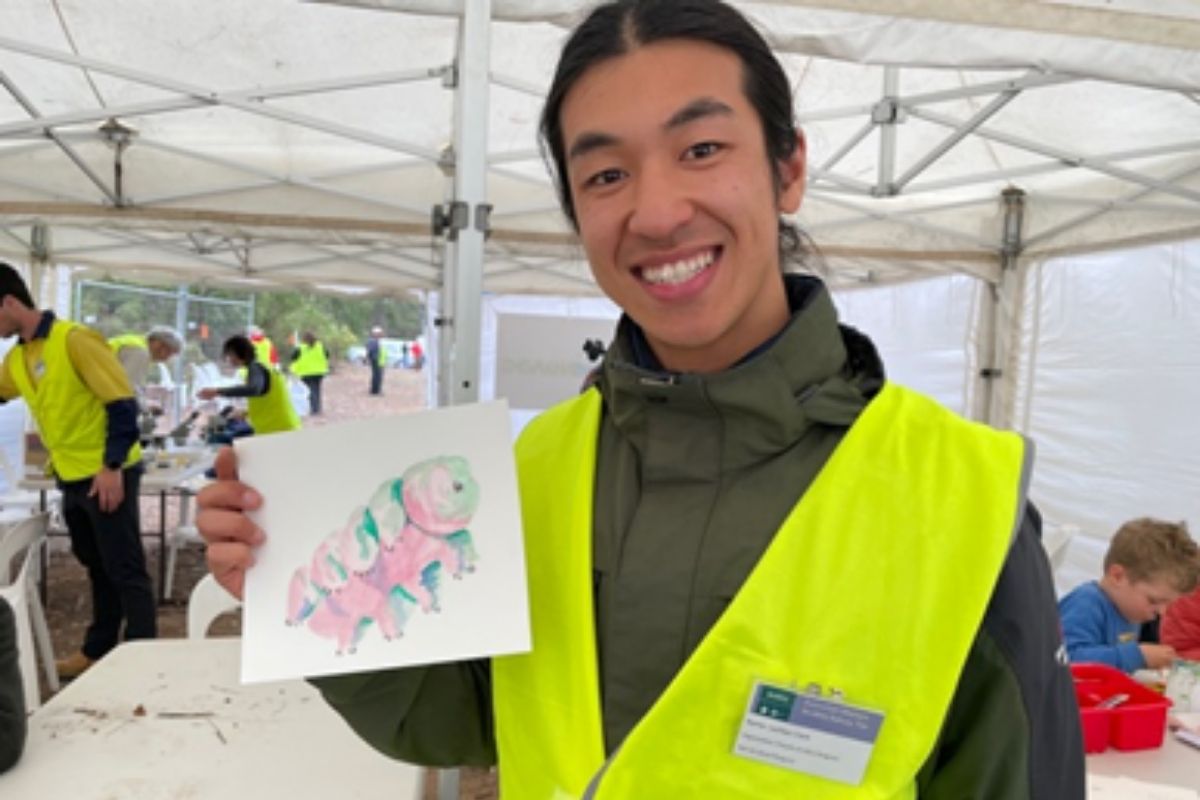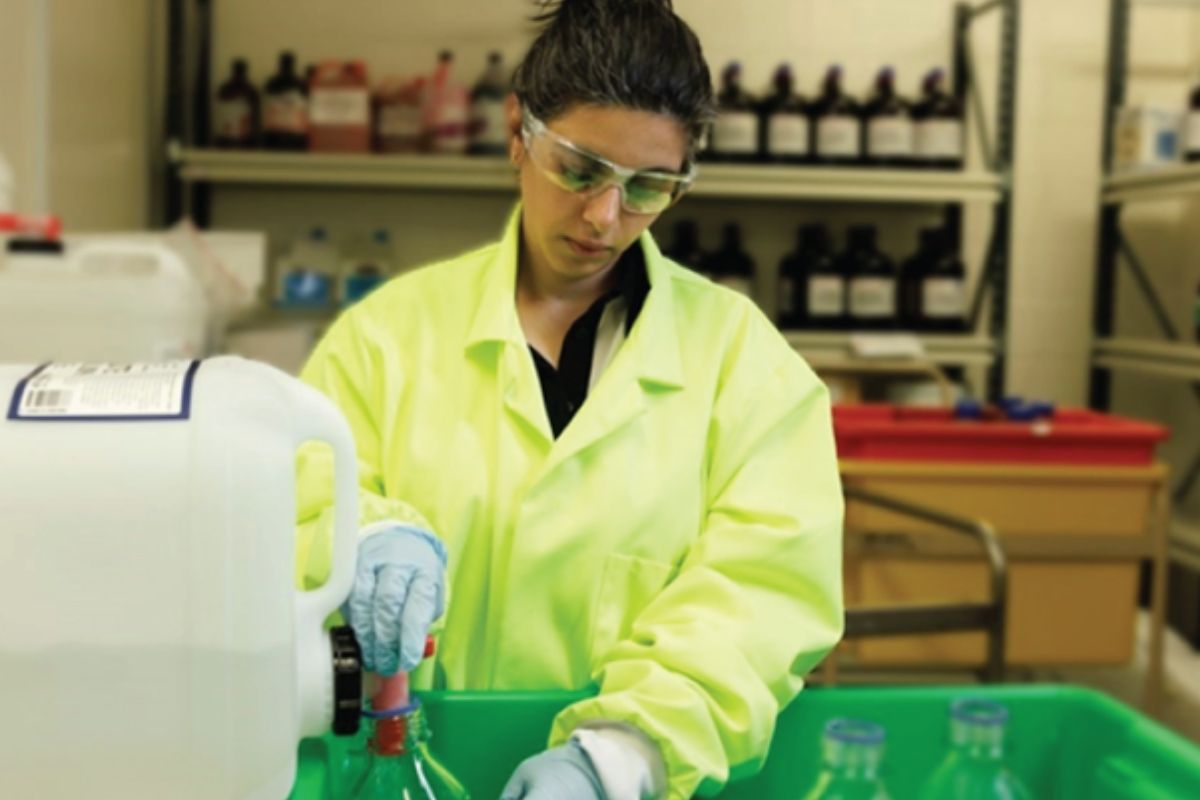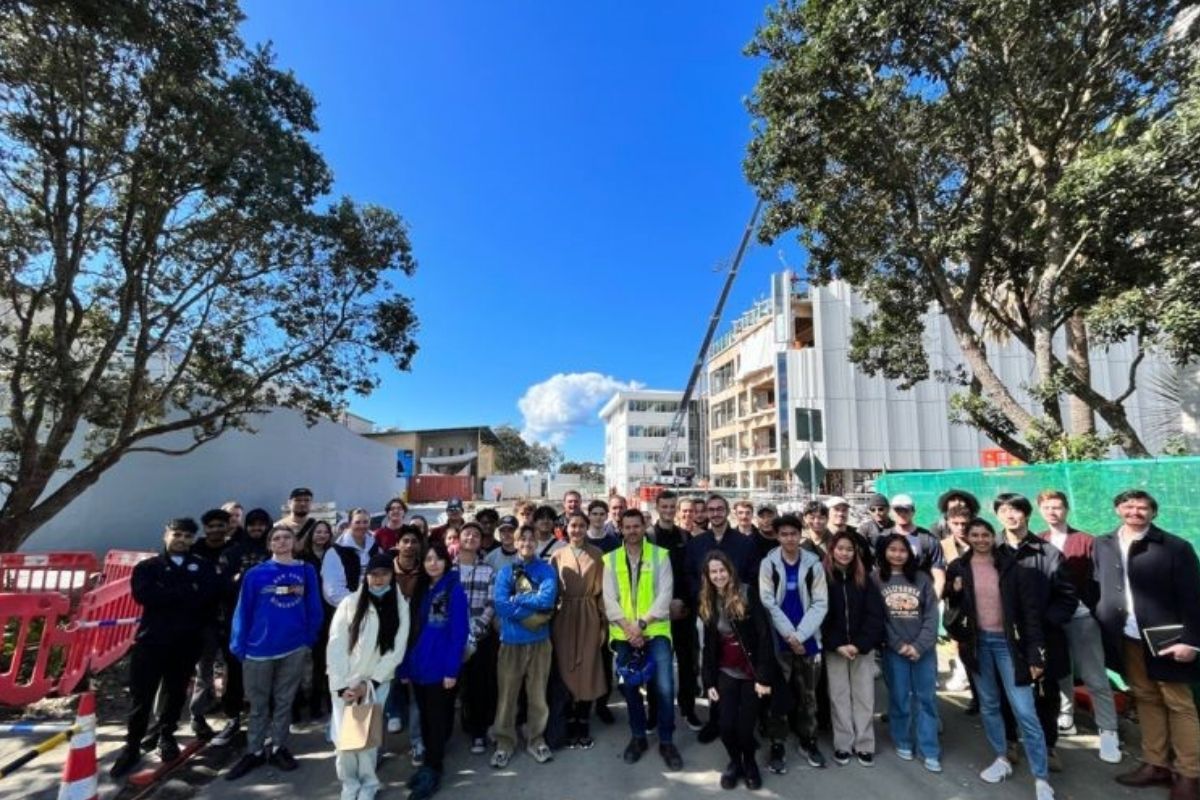Creating Impact category
Queensland University of Technology (QUT) launched the “Clothes for Careers Student Wardrobe Project,” a pop-up shop to support students entering professional careers, by providing free ‘gently worn’ second-hand corporate workwear donated by QUT staff, students, and broader QUT community. This initiative addresses the financial burden of purchasing professional attire, for students engaged in Work Integrated Learning such as internships and placements, and those seeking part-time, full-time or graduate employment. The project aligns with QUT’s priorities of social justice, inclusion, and sustainability. As well as boosting student confidence and career readiness, the project showcases and contributes to the circular economy by reducing fashion waste.

Environmental and Social Benefits
- Cost of Living Relief: The project eases the financial pressures faced by students, particularly those undertaking work integrated learning placements, which are often required as part of a course and professional accreditation and are generally not paid. It directly supports students’ ability to present themselves professionally without the associated costs.
- Circular Economy Promotion: By collecting and redistributing gently used clothing, the project reduces textile waste and promotes sustainable fashion practices within the QUT community.
- Wellbeing Enhancement: The project has positively impacted the wellbeing of both staff and students. Students benefit from reduced stress related to the need to purchase professional attire, while staff experience increased satisfaction from contributing to a meaningful cause.
Leadership and Engagement
- Staff and Student Involvement: The initiative was driven by a small working group of 10 staff and one student, all volunteering their time outside of their core responsibilities. Approximately 60 staff members volunteered to run the pop-up shop, with hundreds more donating clothing.
- Community and Career Support: The project was strategically aligned with QUT’s Career Development and Employability services, with career educators located in the pop-up shop to provide career guidance and advice. This holistic approach ensures students are not only dressed for success but also equipped with necessary career tools.
- Senior Executive Support: The project received strong backing from QUT’s senior leadership, enabling staff to contribute despite resource constraints. This high level of engagement underscores the university’s commitment to student success and sustainability.
Significance to the Sector
- Student Support in Challenging Times: The project responds to the increasing cost of living pressures on students, offering a practical solution that directly supports their transition into professional careers. It is distinct in its origin, being driven by staff initiative rather than a formal university program and highlights the importance of grassroots efforts in supporting student wellbeing.
- Scalable and Replicable Model: The Clothes for Careers project is simple, cost-effective, and easily replicable across other educational institutions and sectors. Its focus on sustainability, student support, and community engagement makes it a model for similar initiatives globally.
- Integration with Career Services: The project’s integration with QUT’s career services provides a comprehensive approach to student readiness, addressing both the material and educational needs of students as they prepare to enter the workforce.
Wider Societal Impact
- Community Building and Giving Culture: The project fosters a culture of giving within QUT, contributing to staff wellbeing through the positive effects of donation and volunteering. Many staff also reached out to their local communities for donations. This culture of support may inspire students to continue giving back to their communities after graduation, creating a ripple effect of social responsibility.
- Support for Broader Student Needs: The initiative aligns with broader efforts to support students facing financial challenges, indirectly addressing issues such as food insecurity. By reducing the cost burden of professional attire, students can allocate their resources to other essential needs.
- Promoting Wellbeing through Giving: The project highlights the psychological benefits of giving, contributing to a sense of community and increased wellness among staff and students alike. This approach is particularly well-suited to educational institutions and large organisations, where short-term, impactful projects can have a lasting positive effect.
QUT’s “Clothes for Careers Student Wardrobe Project” exemplifies a successful, scalable approach to supporting students in their transition to the world of work and professional careers. Through collective effort, sustainability practices, and strategic alignment with career services, the initiative has not only reduced the financial burden on students but also fostered a strong sense of community and wellbeing within the university. This project serves as a model for other institutions and sectors, demonstrating the powerful impact of grassroots initiatives in creating lasting change.
Top 3 learnings
Supported by

Category finalists
Creating Impact/Winners
Creating Impact/Winners
Creating Impact
Creating Impact
Past winners
Benefitting Society/Winners
Benefitting Society/Winners
Diversity, Equity & Inclusion in Sustainability/Winners
Diversity, Equity & Inclusion in Sustainability/Winners
Climate Action/Winners
Climate Action/Winners
Sustainability Institution of the Year/Winners
Sustainability Institution of the Year/Winners
Creating Impact/Winners
Creating Impact/Winners
Creating Impact/Winners
Creating Impact/Winners
Top 3 learnings
Creating Impact category
Queensland University of Technology (QUT) launched the “Clothes for Careers Student Wardrobe Project,” a pop-up shop to support students entering professional careers, by providing free ‘gently worn’ second-hand corporate workwear donated by QUT staff, students, and broader QUT community. This initiative addresses the financial burden of purchasing professional attire, for students engaged in Work Integrated Learning such as internships and placements, and those seeking part-time, full-time or graduate employment. The project aligns with QUT’s priorities of social justice, inclusion, and sustainability. As well as boosting student confidence and career readiness, the project showcases and contributes to the circular economy by reducing fashion waste.

Environmental and Social Benefits
- Cost of Living Relief: The project eases the financial pressures faced by students, particularly those undertaking work integrated learning placements, which are often required as part of a course and professional accreditation and are generally not paid. It directly supports students’ ability to present themselves professionally without the associated costs.
- Circular Economy Promotion: By collecting and redistributing gently used clothing, the project reduces textile waste and promotes sustainable fashion practices within the QUT community.
- Wellbeing Enhancement: The project has positively impacted the wellbeing of both staff and students. Students benefit from reduced stress related to the need to purchase professional attire, while staff experience increased satisfaction from contributing to a meaningful cause.
Leadership and Engagement
- Staff and Student Involvement: The initiative was driven by a small working group of 10 staff and one student, all volunteering their time outside of their core responsibilities. Approximately 60 staff members volunteered to run the pop-up shop, with hundreds more donating clothing.
- Community and Career Support: The project was strategically aligned with QUT’s Career Development and Employability services, with career educators located in the pop-up shop to provide career guidance and advice. This holistic approach ensures students are not only dressed for success but also equipped with necessary career tools.
- Senior Executive Support: The project received strong backing from QUT’s senior leadership, enabling staff to contribute despite resource constraints. This high level of engagement underscores the university’s commitment to student success and sustainability.
Significance to the Sector
- Student Support in Challenging Times: The project responds to the increasing cost of living pressures on students, offering a practical solution that directly supports their transition into professional careers. It is distinct in its origin, being driven by staff initiative rather than a formal university program and highlights the importance of grassroots efforts in supporting student wellbeing.
- Scalable and Replicable Model: The Clothes for Careers project is simple, cost-effective, and easily replicable across other educational institutions and sectors. Its focus on sustainability, student support, and community engagement makes it a model for similar initiatives globally.
- Integration with Career Services: The project’s integration with QUT’s career services provides a comprehensive approach to student readiness, addressing both the material and educational needs of students as they prepare to enter the workforce.
Wider Societal Impact
- Community Building and Giving Culture: The project fosters a culture of giving within QUT, contributing to staff wellbeing through the positive effects of donation and volunteering. Many staff also reached out to their local communities for donations. This culture of support may inspire students to continue giving back to their communities after graduation, creating a ripple effect of social responsibility.
- Support for Broader Student Needs: The initiative aligns with broader efforts to support students facing financial challenges, indirectly addressing issues such as food insecurity. By reducing the cost burden of professional attire, students can allocate their resources to other essential needs.
- Promoting Wellbeing through Giving: The project highlights the psychological benefits of giving, contributing to a sense of community and increased wellness among staff and students alike. This approach is particularly well-suited to educational institutions and large organisations, where short-term, impactful projects can have a lasting positive effect.
QUT’s “Clothes for Careers Student Wardrobe Project” exemplifies a successful, scalable approach to supporting students in their transition to the world of work and professional careers. Through collective effort, sustainability practices, and strategic alignment with career services, the initiative has not only reduced the financial burden on students but also fostered a strong sense of community and wellbeing within the university. This project serves as a model for other institutions and sectors, demonstrating the powerful impact of grassroots initiatives in creating lasting change.
Supported by

Related finalists
Creating Impact/Winners
Creating Impact/Winners
Creating Impact
Creating Impact
Other finalists
Climate Action

Driving Towards Tomorrow’s Campus with Vehicle-to-Grid EV Technology
As part of Flinders University’s drive to innovate and become a leader in climate action, the University launched its Vehicle-to-Grid (V2G) initiative. This involved installing and maintaining 20x V2G and smart chargers for its growing electric vehicle fleet. Leveraging 100% renewable energy generated by ENGIE’s Willogoleche Wind Farm and Flinders University’s solar power systems, this enables the storage of renewable energy in EV batteries to be discharged on campus during peak demand periods. Hence, allows for these EV fleets to operate as a Virtual Power Plant (VPP) to deliver peak demand management and optimization of behind-the-meter generation.
Overall, this initiative demonstrates the reliability and scalability of bi-directional and uni-directional smart-charging systems for EVs in reducing GHG emissions while facilitating teaching, research, and innovation opportunities. Moreover, it exemplifies a sustainable and innovative solution to scale energy storage technology and increase renewables.
Sustainability Champion – Staff/Winners

Brandan Espe
Environmental Officer / Acting Grounds Supervisor
Brandan has brought over 50 federally listed Endangered species of plant into the James Cook University living collection, many of which have never been cultivated and are found in no other collection in the world.
Of these, over half have been sustainably wild collected, inclusive of field and clone data, so they can be used for ongoing conservation, research and teaching, the remaining being sourced from private and partner organisations through favours of service or trades.
He personally funded the project from 2019-2022, until funding was awarded for the program due to its success, with the program now being engrained into the Universities landscapes for ongoing management should he leave JCU, creating a threatened species legacy collection.
The program has now expanded beyond this, with an additional 48 species now funded for further addition, some of which are only known from less than 5 sightings in history.
Student Engagement

Sustainability Leaders creating real impact!
La Trobe created a unique Sustainability Leaders volunteering program to increase engagement with students on campus and empower them to act against waste and promote sustainability. It included the following initiatives:
- Promoting the reusable crockery implementation,
- Increasing knowledge action of other students on campus to diversion comingled recycling and organic waste from landfill.
- Focus on waste audits and data,
- Improved signage through new waste posters for students living on campus.
- Collaboration with Cirka (our cleaning and waste partner) to create a waste wall and;
- Learning all things sustainability (net zero, biodiversity, waste, reusables, engagement)
These initiatives yielded significant results and with a reduction in waste contamination by almost 40% at the residential buildings and engagement with over 80 groups of people for the Reusable Revolution.
Creating Impact

Where knowledge meets habits: Empowering students for a sustainable tomorrow
Our online Sustainability Challenges offer participants an engaging, self-paced learning experience centered around a specific United Nations Sustainable Development Goal (UNSDG). Requiring minimal resourcing and at zero-cost to participants, we’ve created replicable, compact, scalable, and impactful learning opportunities that result in real impact.
The Challenges follow a structured process that moves participants from knowledge gain to simple action to celebration, to establish small but mighty habits relating to waste and carbon emissions. This approach recognises that knowledge alone is often insufficient to drive behaviour change, and that ease of action and celebration are crucial components in creating sustainable habits.
Sustainability Champion – Staff/Winners

Catherine (CeeJay) Donovan
Veterinary nurse – Anaesthesia
From establishing the Massey Vet School Green Team to leading impactful initiatives, my commitment to environmental sustainability has been making waves. With the help of my team, I have accomplished numerous small, yet meaningful actions, including integrating a sustainability lecture for final year vet students and implementing battery recycling alongside rechargeable battery use. Our larger projects encompass the introduction of green waste and soft plastics recycling bins, an energy audit resulting in power-saving measures, and playing a part in a successful rubbish audit. I spearheaded the ‘6 in 6’ campaign, empowering individuals with six simple steps for workplace sustainability. Through the SustainaVet social media pages I help to educate and inspire peers nationwide. As the Massey School of Veterinary Science sustainability champion, I had the privilege of speaking at the annual veterinary conference on sustainability in clinical practice. Currently I’m conducting pioneering research on responsible cat waste disposal. Together, we’re forging a greener future, one initiative at a time.
Sustainability Champion – Student

Louis Walmsley
SDG Coordinator Monash Association of Sustainability, Office Bearer Monash Student Association’s Environmental and Social Justice Department, Masters of Environment and Sustainability Student
Louis is an exceptional student sustainability leader at Monash University. His passion and dedication to sustainability have made a significant impact on the community. Louis’s values revolve around sustainability, which is evident upon meeting him. He actively participates in various sustainability groups, demonstrating his commitment to creating a more environmentally conscious society.
One of Louis’s notable involvements is with Precious Plastic Monash, where he organizes remarkable events and fosters collaboration among like-minded individuals, student groups, and staff. His contributions to the Monash Association of Sustainability have allowed him to conduct valuable research on plastic usage and climate action, resulting in positive changes within the university.
Through his work with the Monash Student Association, Louis has engaged hundreds of students in fun and interactive sustainability initiatives. He took the initiative to organize a sustainability food fair, which was one of the largest sustainability-related events held at Monash post-COVID. This accomplishment is a true testament to Louis’s hard work and creativity.
Louis is an outstanding student leader whose efforts in sustainability have had a lasting impact on Monash University and its community. His inspiring nature resonates with everyone who knows him.












